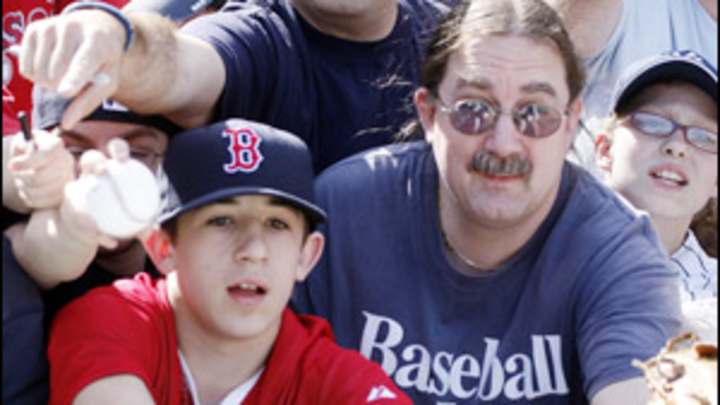Fickle fans


There I was, in Seattle to catch a Mariners game last August. The air was crisp, the coffee was fresh ... and the hat of choice throughout the city was the red B of the Boston Red Sox. Sox fans had invaded the Emerald City, like an occupying army, planting the flag of Fenway.
In the aftermath of the 2004 World Series the phenomenon of Red Sox Nation has been taken to a whole new level, where fans of the AL champions trail the team around the country, drowning out home crowds and bringing a little bit of the Fens to every park. They're like Deadheads with less weed and more clogged arteries. I spoke to a guy named Robin, who said, "I live in Portland and I love baseball. I had to choose a team to root for, and the Red Sox were the most fun to follow."
Robin is part of a growing breed in sports: bandwagoneers ready to cheer for whatever team is standing at the top. It's best not to ask the Robins where they were back in 1993 when the great Bob Zupcic was patrolling right field in Fenway, or how they coped when "the curse" was something Sox fans carried on their backs like they were walking the Stations of the Cross. They weren't around because they represent a growing strain in sports, the fickle fan.
It's not just about Red Sox Nation, a Nation that will implode like the Prussian Empire as soon as the team takes a tailspin. The Rockies ownership catered to their fickle fans as well this week by selling all their World Series tickets online. This cut out the diehards willing to stand on line and sleep in the street for tickets. It also opened up the Series to out of state converts to Rocktober, people who weren't cheering the team before they were winning 21 of 22 games, didn't have to pay for Coors Field out of their tax dollars, and three months ago thought Matt Holiday was a special day when you don't have to wipe your feet.
Fickle fans, like those who want a taste of Rocktober, are catered to by teams because they represent new revenue while the diehards can always be taken for granted. While the diehards stew, the fickle fans hop from team to team like bipolar jackrabbits, treating sports like bad day traders buying high and selling low.
The rise of the fickle fan is the result of the intersection of two uniquely American trends and traits. One is sports as glitz and glamour entertainment. The Us Weekly-ification of sports -- the dwelling on personality and scandal, the cross-pollination with Hollywood premieres creates a far more casual fan and no casual fan will latch onto the Kansas City Royals or Charlotte Bobcats for kicks.
The other trait is win-addiction. We are a culture that demands victory. We treat sports, war, or business like binary operations that produce either success or failure. In 1996, Nike had a billboard during the Atlanta Olympics that read, "You don't win silver, you lose gold." The fickle fan is always going for the gold. They live to conquer and losing -- or being a perpetual loser -- isn't an option. Like motocross racer Damon Hill said, "Winning is everything. The only ones who remember you when you come second are your wife and your dog." The shame is that where else but sports could you have "lovable losers" like the Cubs that demand loyalty despite years of heartbreak?
Of course, fickle fans get to mainline with the rush of triumph. But as more people come to sports through the valley of entertainment, I hope they realize that they lose so much more.
Living in Washington, D.C., I stay true to the Wizards, Ravens, and Mets. (I can't get with the Redskins because it's hard to root for an ethnic slur. And I can't get with the Nationals because the city building a billion dollar stadium for them over the objections of the city's majority so it's hard to see them as a home team.) I like the Mets because I was raised in New York City. I loved them when they were in last place with a great rookie named Darryl Strawberry, and Jesse Orosco in the pen. I loved them when they knocked out the Sox in 1986. I loved them when Bobby Bonilla wore earplugs to the plate to avoid the boos.
Sticking with your team makes you feel connected to your city, win or lose: a common vocabulary from the bar to the barbershop. A relationship with a team should mean something more than reflect our collective thirst to conquer. So fickle fans of the Red Sox and Rockies here's a suggestion: if your team wins, hold them close. If they lose, hold them closer. It's worth it.
